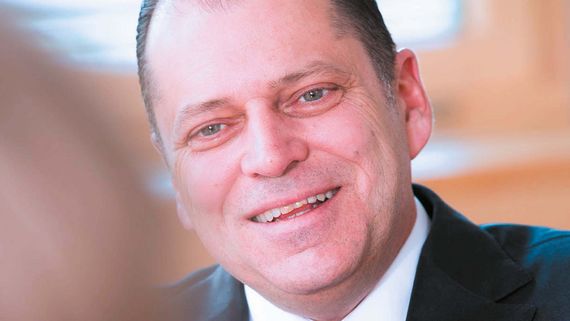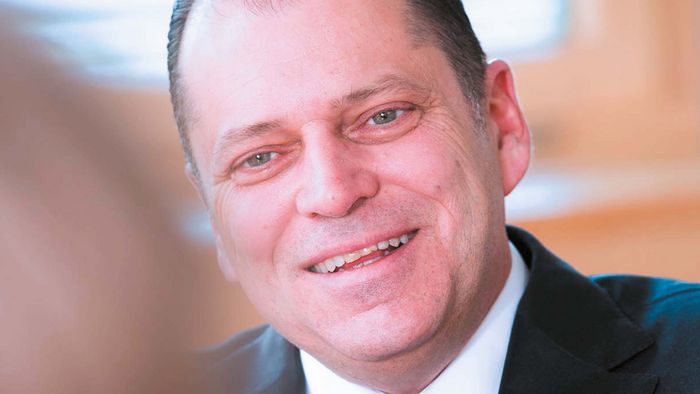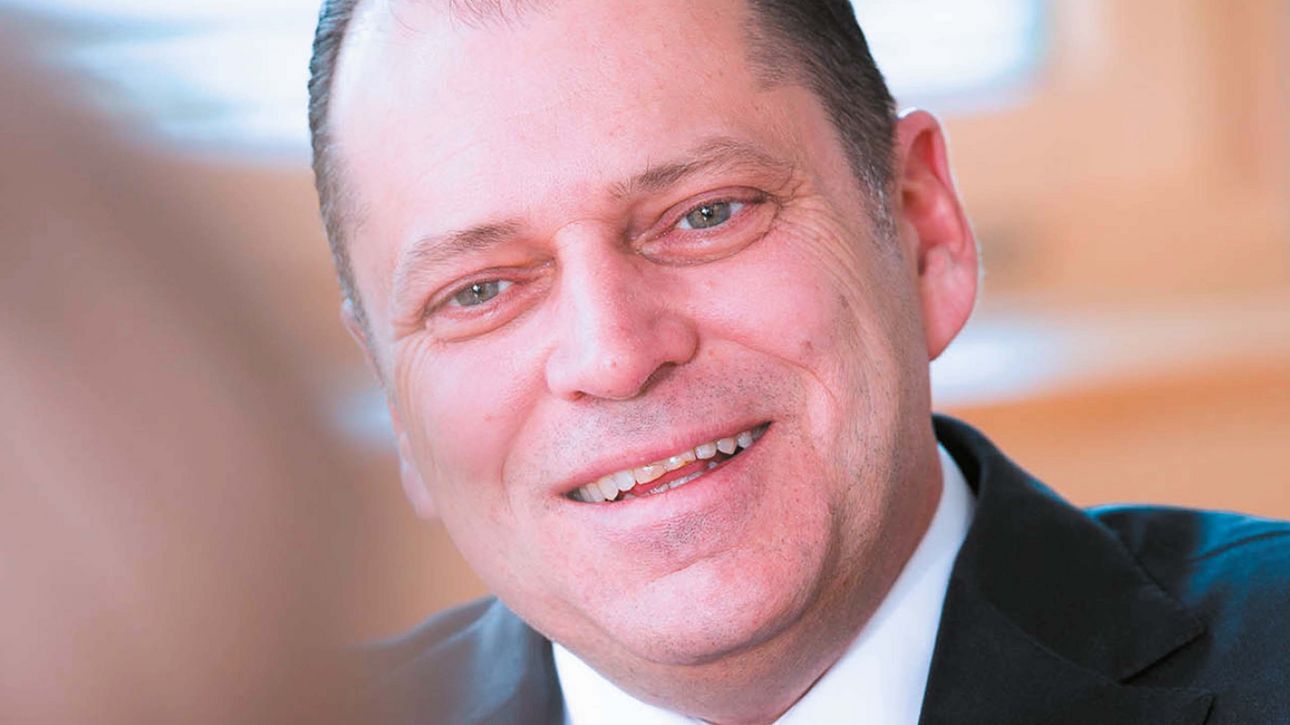How digitalization increases productivity, what the UNITED GRINDING Group promises from the Grinding Symposium and what he himself is most looking forward to during the event – CEO Stephan Nell explains in the interview
INVESTMENT IN A RELATIONSHIP



What does the UNITED GRINDING Group expect from the Grinding Symposium?
Stephan Nell: Our mission is basically to make our customers more successful. The Grinding Symposium is a key element for this. We want to present our customers with the latest news from our industry and inform them about existing and new technologies which will help them work more efficiently right now. We also want to provide them with relevant information about issues of tomorrow. These don’t have to just be directly about grinding. In our lectures we include topics that illuminate general trends and challenges of the future, which also affect our customers outside the world of grinding. Last but not least, we want to enter into an exchange with our customers and find out their views on relevant topics, so that we can continue to offer the right solutions in future and help our customers become even more successful. If we succeed in doing this, we have achieved our goal.
But the Symposium isn’t a sales event?
Definitely not. Most visitors are existing customers, and the Symposium is also a way of saying thank you to them. We endeavor to offer added value and give our customers something back for the trust they have placed in us over the years.
This Symposium will include the FutureLAB for the first time. What can visitors expect there?
We separate this deliberately: The technologies on the technology stations can be ordered and used right now. In the FutureLAB our aim is to provide an insight into topics that will not necessarily be brought to market tomorrow. This is comparable to an automotive manufacturer who presents a prototype at a trade fair. We show what developments we have coming up in the next few years and hope to get feedback from our customers.
Studies indicate that the expected increase in productivity due to digitalization has not yet happened in machine manufacturing. How do you perceive this development?
We can only speak for ourselves here. Naturally productivity is always an important issue for us too. Let me give you an example. We operate a smart factory and the aim here is to increase the Overall Equipment Effectiveness (OEE). Our solution was a visualization tool for our employees, in order to explain the issues at stake. This resulted in a customer solution which will also help our customers increase their productivity by visualizing relevant parameters. I’m talking about the products of our UNITED GRINDING Digital Solutions™.
In this case this means, more productivity thanks to digitalization.
For us it is very important that everything we do in the area of digitalization always has added value for the customer. I see many technological solutions at trade fairs and wonder, ‘Why are they doing that?’ And often I have the feeling that the answer is: ‘Because they can, not because customers need it’. We always ask ourselves: ‘Are we only doing this because we can, or does it bring real added value?’ Do you really want to know the exact temperature of the front left wheel hub of your connected car? Hardly. But you do want to know if it breaks. So the task is to consider how I can achieve an increase in safety or a rise in productivity with the collected data. And if I know I have to do something at a certain point, then I’m on the way to Predictive Maintenance. And if we evaluate and use digitalization and the acquired data intelligently in this way, then digitalization can absolutely contribute to increasing productivity.
To what extent do new business models emerge as a result of digitalization?
In principle I can say: We are, and will remain, machine manufacturers. We won’t become a software business, others can do that better. I also don’t know if you can separate digital and analog quite so easily. We develop intelligent components for machines, that’s a combination of digitalization and machine tools. The great thing about machine tools is that without them there would be nothing here in this room – no tables, no chairs and not even a camera. If, however, as already mentioned, we are able to collect relevant data and evaluate it intelligently and beneficially for the customer, then I could very well imagine new business models emerging from this.
Does the focus on digitalization sometimes obscure other optimization potential?
At UNITED GRINDING we separate this. We have employees who focus on digitalization, and entire departments that are occupied with mechanical development. There are always aspects in the grinding process that contribute to increasing our customers’ efficiency. The WireDress® dressing technology, for instance, has nothing to do with digitalization and achieves significant efficiency gains. We work intensively on such aspects.
Automation is viewed differently in a global comparison – in Germany it is associated with the fear of losing jobs, while in China it is seen as a driver of development. How does a global company position itself for this?
I don’t think it’s so difficult. Automation in terms of technical solution is the same everywhere. The motivation for buying it is different. In our industry it’s always about precision, and automation solutions can make an important contribution here. Of course, the motivation can also be to remedy shortages of skilled labor. This is an issue in the USA, where there is a shortage of thousands of skilled workers in the manufacturing industry, or in Europe, where we have aged societies. The question is, whether automation will ultimately destroy jobs. But there have already been many changes in industrial evolution – and society has always adapted. Therefore I’m not so pessimistic.
The UNITED GRINDING Group configures its technology specifically for the individual markets. What does this mean for automation?
For us it’s always about offering customers what they need. And that’s not the same the world over. Our mission is: To be international, to be customer-focused, to understand the customer. This doesn’t just mean language, but production philosophy. We have customers who manufacture the same parts in different regions of the world – and they do it differently everywhere. We help our customers find the best solution for the specific requirement in the respective country.
But automation also has the dimension of labor costs. Robots don’t get sick, don’t take holidays and don’t receive a pension. What does automation mean in this respect?
As we’ve said, there have already been many changes in industrial evolution. None of these have ever meant that people were no longer needed as workers. These changes have always given rise to new challenges and opportunities.
At the beginning of 2019 the Group published its business figures for the first time. How would you assess the financial year 2018 and which developments do you expect for 2019?
2018 was an absolutely record year. We achieved a turnover of around 800 million Swiss francs, that’s 700 millions Euros, and had a double-digit return on sales. Also helped by the flourishing world economy, of course. The outlook for 2019 is more difficult, there are many problems all over the world, you only need to read the newspaper: What will happen with Brexit? Which trade barriers will there be in future? And many other questions. These are issues that are difficult to predict and they will lead to uncertainties and thus to a slowdown in demand. We are prepared for this development.
Since the middle of 2018 the UNITED GRINDING Group has no longer been part of the Körber Group. What impact does this have on customers?
The change of ownership has no direct influence on the individual company brands or the customers. You can also see that the change was uneventful. There was no change in strategy, the management is the same, the companies are the same. I think the good thing is that we can now think and act even more entrepreneurially.
Back to the Grinding Symposium. You will be there the whole time. What are you most looking forward to?
I’m looking forward to the customers most of all. That’s what I always enjoy, at trade fairs too: Talking to the customers and hearing what interests them. And also hearing about what we could do better.



